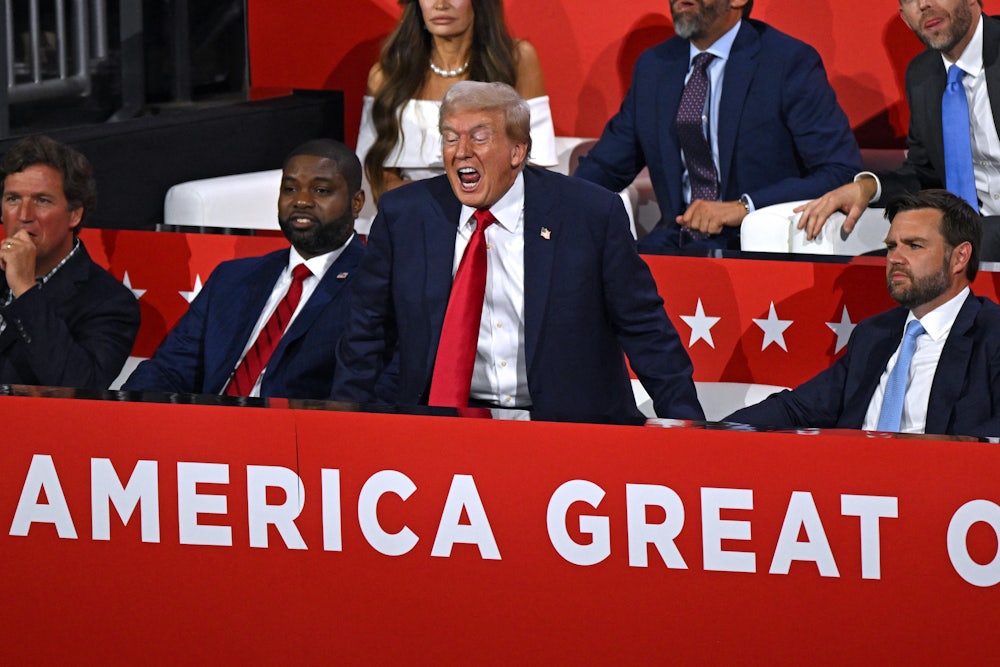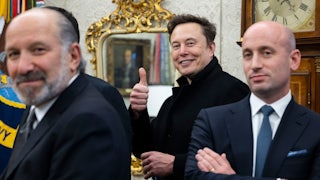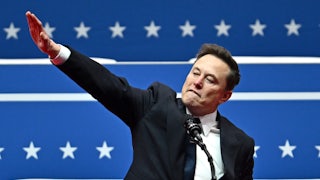More than 30 years ago, the journalist Chris Matthews argued in The New Republic that there was “an accepted division of chores in American politics today,” in which Republicans “protect us with a strong national defense” and “worry about our business affairs” while Democrats “look after our health, nutrition, and welfare.” “The paradigm for this snug arrangement,” he added, is “the traditional American family. ‘Daddy’ locks the doors at night and brings home the bacon. ‘Mommy’ worries when the kids are sick and makes sure each one gets treated fairly.”
This “apt model for today’s political household,” as Matthews called it in 1991 amid the Persian Gulf War, became an enduring paradigm in political science and commentary—a convenient rhetorical shorthand, at least, if not necessarily a foolproof framework for understanding the Democratic and Republican parties. But at the dawn of the second Trump administration, as with so much other conventional wisdom, the parenthood analogy is in desperate need of revision. Daddy, specifically, has become less a protector of the home than a fearful menace to his family—including Mommy.
Matthews’s characterization of Democrats as the Mommy party still rings true: They’re warm and caring, with a view that government’s purpose is to nurture the people. Think LBJ’s Great Society, or FDR’s New Deal. Even Barack Obama’s Affordable Care Act and Joe Biden’s limited student loan forgiveness—while not the sweeping, transformative measures progressives had hoped for—were rooted in the premise that the role of the federal government is to help its citizens, easing their pain and proverbially tucking them into bed.
And Matthews’s characterization of Republicans has held up to a degree too: The Daddy party practices tough love, promising to protect Americans from outside threats while also expecting people to pull themselves up by their bootstraps. “In this way, disciplined people become self-reliant,” linguist and philosopher George Lakoff, who explored the mommy-daddy paradigm in his 1996 book Moral Politics, described the GOP perspective in a 2003 interview. “Wealth is a measure of discipline. Taxes beyond the minimum needed for such government take away from the good, disciplined people rewards that they have earned and spend it on those who have not earned it.”
Then, as now, this tough love strays into meanness. Matthews reported on a House GOP retreat where the “favorite target” was “welfare mothers.” Edward Luttwak, the conservative author and military strategist, drew laughs when he quipped, “Every time I read about graft in the welfare system, I’m happy because it means that some of the money is not going for counterproductive activity.” And George Gilder, the conservative investor and author, was cheered for saying, “The only thing single parents produce is crime, drugs, violence, disease, and Democrats.”
None of this fully accounts for the abject cruelty underpinning President Donald Trump’s first month back in office. He immediately froze foreign aid and moved to eviscerate the U.S. Agency for International Development, which helps alleviate hunger, improve health care, and provides disaster relief in the poorest parts of the world; food was left to rot in ports and warehouses around the globe. He slashed grants for medical research (a federal court has put a stop to it for now), imperiling work on cancer and infectious diseases. He engineered a mass firing of as many as 220,000 federal employees that is ongoing as you read this, with tens of thousands having received impersonal termination notices.
Forget stern-but-loving Daddy. Trump’s GOP is downright belligerent: the Daddy who berates umpires at Little League games and makes his own kid cry for dropping a fly ball, who other parents won’t carpool with because he flips the bird while cutting off motorists. “What we have now is a violent father, and a father to be feared. The one to whom other parents always go, ‘Who the hell is that guy?’” said scholar Matthew MacWilliams, author of the book On Fascism: 12 Lessons From American History.
Trump acolyte Tucker Carlson gave an accurate (if creepy) preview of this abusive, menacing Daddy at a Georgia rally weeks before the election. “Dad comes home, and he’s pissed!” Carlson said to a cheering crowd. “When Dad gets home, you know what he says? ‘You’ve been a bad girl. You’ve been a bad little girl, and you’re getting a vigorous spanking right now.’ … And no, it’s not going to hurt me more than it hurts you. No, it’s not. I’m not going to lie. It’s going to hurt you a lot more than it hurts me. And you earned this. You’re getting a vigorous spanking because you’ve been a bad girl, and it has to be this way.’”
Fast-forward to late January, when Trump was visiting California to assess damage from the Los Angeles wildfires. Empathy? A promise to protect Californians from danger? Maybe a bromide about showing bravery in the face of misfortune? Nope. After briefly praising firefighters, Trump blamed Democrats for the damage, threatened to withhold disaster relief, and spewed a stream of easily debunked lies. And Republicans loved it. “I’m glad Trump’s here at the moment,” actor Mel Gibson, who lost his Malibu home in the fires, said on Fox News. “It’s like Daddy arrived, and he’s taking his belt off, you know?”
“The GOP itself really seems to be lining up behind their leader with a similar constellation of aggressive attitudes and behaviors,” said Nicholas Rule, a University of Toronto psychology professor. “If the 2016 campaign liberated Americans to say [things that] we teach children [are] impolite, the 2024 campaign may have liberated them to do [things that] we teach children [are] wrong: acting out their worst impulses.”
In 2016, Trump declared, “I alone can fix it.” Now he’s determined to blow things up. He and his sidekick Elon Musk are perverting the GOP brand into something that isn’t about traditional masculinity but rather machismo—a view of government not as Father Knows Best, but as an impediment to powerful men. Only weaklings need the government’s help; real men just need the government to get out of their way.
“It’s not even that they are opposed to social services. They are, but I really do think it goes beyond that, in the sense that government in general emasculates people, meaning men,” said author John Feffer, project director and associate fellow at the Institute for Policy Studies. “Because it interferes with a man’s prerogative to control his wife, the education of his children, his ability to provide a kind of full-spectrum services of his own to his family. It’s not just that government provides these services. It’s the very notion of any interference into the male sphere.”
On the eve of inauguration last month, Representative Byron Donalds crowed on Fox News, “Daddy’s back!” The same day, Representative Lauren Boebert posted on X, “Daddy’s home!” But Trump is not just back; he’s barreling through the front door with a vengeance. And where is Mommy amid this rampage? That’s what many Americans are wondering, as Democrats in Congress come under fire from their constituents and the left-liberal press—including The New Republic—for cowering rather than standing up to Trump. It’s as if they are the babies of strict fathers, left to cry themselves to sleep.
Here, again, Matthews’s 1991 essay is instructive. “Don’t underestimate the appeal of this new two-parent arrangement in American politics,” he wrote. “By focusing on ‘mommy’ matters, today’s Democrats avoid the brutal, intraparty debate that tore at the party’s soul during Vietnam. By playing down their Persian Gulf votes in the 1992 election, Democratic lawmakers hope to protect themselves from a second Bush landslide.”
Though Matthews was writing about foreign policy, the Democratic tendencies on display are depressingly familiar. The party’s failure to fight Trump early in his second administration appears to be driven in part by an assumption that they lost the election because they focused too much on the threat Trump faced to American democracy—and that voters eventually will reward them for not attacking Trump as aggressively as before. Ironically, it’s this very timidity and overcaution, especially among Democratic leaders on the Hill, that’s starting to fuel a debate that could indeed tear at the party’s soul, imperiling its chances of clawing back power in future elections.






